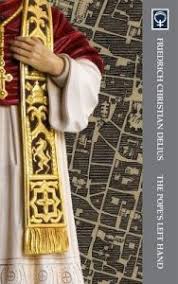“The hands, what is it about the hands? Now I realized why I was so fixated on them. I had already applied my imagination to them once before, exactly six months earlier, when, in front of the television, I had long pondered whether these hands, whether the right papal hand―I always assumed he was a right-hander―was still capable of delivering a slap in the face.”
The pope’s left hand
By Friedrich Christian Delius
The pope’s left hand by Friedrich Christian Delius— impeccably translated from the German by Robert Cantrick—is a journey into Rome’s, and Italy’s, most unfathomable corners, into the “Roman mosaic”, as the author says. The protagonist’s musings begin quite simply, quite unexpectedly when he finds himself sitting just a few meters from the Pope in a Protestant church in the center of Rome. Both archaeologist and part-time tour guide, the protagonist fixes upon the pope’s left hand, the one nearest to him, and, like the scholar he is, studies that hand, all it implies, and all it calls to mind: “So my eager eyes concentrated on the hands, as the archaeologist in me had learned to do. First, take in the overall picture, then carefully expose each layer one by one…” And thus we follow that hand wherever it may lead, through the streets of Rome, into museums, into the political life of the country and the church, and into the life of the pope himself: “They seduced me Into palm reading from a distance…” Enthusiastically, we follow the trail of the protagonist’s thoughts and a fantastic world opens before us, a world we may or may not have expected, and one which will never leave us again.
Delius is a formidable guide, exhaustive and enlightening; The pope’s left hand is light, dark, deep, and whimsical; and together, author and book, give insight into the Italian world exactly how it is: chiaroscuro.
I was lucky enough to interview Mr. Delius and Bob Catrick was wonderful enough to translate the author’s replies. Here it is:
M: Thank you so much for agreeing to speak to me in this very dramatic moment in time, Mr. Delius. You are, if I am not mistaken, in the ICU in Berlin. How are you?
| F. Delius:
Es geht mir ausgezeichnet! Auf der Intensivstation und in großer Lebensgefahr habe ich mich vor 12 Jahren befunden – nun schreibe ich darüber. Das hatte ich beschlossen, bevor Covid 19 begann, die Welt zu erobern. Es ist sehr bizarr, aber auch tröstlich, diese Erfahrungen jetzt erzählerisch zu präzisieren und sie demnächst anderen zu vermitteln. |
Translation:
I am doing very well! Twelve years ago I found myself in the intensive care unit in danger of my life—now I’m writing about it. I had decided to do that before Covid-19 began conquering the world. It is bizarre but also comforting to be setting down these experiences now in story form and preparing to tell them to others. |
M.: As you know, I live in Italy. I read your book, The pope’s left hand in “un sorso”, as they say here. I know you were born in Italy: can you explain your relationship with the country? Can you tell me what inspired the book? What parts stem from personal experience? What parts are the wanderings of a very active and fertile mind?
| F. Delius:
Meine Eltern sind Deutsche und waren nur ganz kurz in Rom, ich bin in Deutschland aufgewachsen, war aber immer stolz, ein geborener Römer zu sein. 1971 war ich ein Jahr in Rom als Stipendiat der Künstlervilla Massimo in Rom, das war die erste richtige Annäherung. Seitdem ist das Interesse an Italien und meinen dortigen Freunden ständig gewachsen. Von 2001 bis 2013 lebte ich überwiegend in Rom, und in der Zeit habe ich meine Kenntnisse über Rom und Italien vervielfacht, die nun die Grundlage bilden für „Die linke Hand des Papstes“. Wenn Sie fragen, welche Teile aus persönlicher Erfahrung, welche aus Phantasie entstanden sind, kann ich nur sagen: Das Wunderbare an der Kunst, an der Literatur ist doch, dass beide Elemente auf originelle Weise miteinander verschmelzen. Ohne Erfindung keine Wahrheit der Kunst. Ohne Erfahrung, Wirklichkeit, Kenntnis aber auch nicht. |
Translation:
My parents are German and were in Rome for only a short time. I grew up in Germany, but I was always proud of being born Roman. In 1971 I was in Rome for a year on a scholarship at the Villa Massimo. That was my first real experience there. Since then, my interest in Italy and my friendships there have grown steadily. From 2001 until 2013 I lived mostly in Rome, and during that time I expanded my knowledge of Rome and Italy, which laid the basis for The Pope’s Left Hand. When you ask what parts of it come from personal experience and which from imagination, all I can say is that the wonderful thing about art and about literature is that those two elements blend in original ways. Without invention there is no truth to art. But without experience, reality, knowledge there is no art, either. |
M: Has the Coronavirus, and what is happening in Italy today, changed your views of the country and the church.
| F. Delius:
Nein. Aber ich bin beschämt und wütend über die ökonomische Dummheit und menschliche Herzlosigkeit der deutschen Regierung, zum Beispiel mit Corona-Bonds Italien, Spanien zu helfen und die Idee Europa zu retten. |
Translation:
No. But I’m ashamed and outraged at the economic stupidity and inhuman heartlessness of the German government, for example, their refusal to aid Italy and Spain with Corona bonds and thereby salvage the idea Europe. |
|
Die linke Hand des Papstes Friedrich Christian Delius Die Hand, dachte ich am ersten März-Sonntag des Jahres 2011 — was ist mit der Hand? Offen, leicht gebogen aus dem schwarzen Ärmel entspannt nach unten hängend, die Finger locker beieinander, weiß und weichlich, was tut die Hand des Papstes, wenn sie nichts tut? Viel erfahren wir Zuschauer über diesen Mann, ob wir wollen oder nicht, ständig werden seine Gesichter, seine Gewänder, seine Fensterbühnen gezeigt, jeden Sonntag könnte man ihn singen, sprechen und segnen hören, täglich möchten Tausende mit ihm gefilmt oder fotografiert werden, überall wird er zitiert, wird sein violettes Lächeln auf Postkarten verkauft, seine Macht beschworen, gesucht, bezweifelt, seine Rolle geliebt, geschätzt oder verachtet — aber seine Hände, nichts weiß man über seine Hände, was ist mit den Händen? * Ich blieb konzentriert als Beobachter der Schreibhände, die so viel bewegen könnten auf der Welt und sich jetzt nicht bewegten, und hatte gleichzeitig die linke Hand des Apoll vor Augen, des Verführers, des Möchtegern-Vergewaltigers. Die berühmte Skulptur, gemeißelt, geschlagen, geschliffen während des Dreißigjährigen Krieges, als Rom kräftig mitwirkte, Deutschland zu vergewaltigen – eine der sonderbaren Gleichzeitigkeiten, eine der Quizfragen ohne Antwort: Was haben Apoll und Daphne mit dem Dreißigjährigen Krieg zu tun? Hände, die sogleich die nächste Frage weckten, ob es richtig war, was ich mir gemerkt hatte, dass weder die Schreibhände des zehnten Innozenz, die Velázquez gemalt hatte, noch die seiner Nachfolger den Westfälischen Frieden von 1648 unterzeichnet und anerkannt hatten, die römische Kirche folglich seit mehr als dreihundertfünfzig Jahren mit den Deutschen im Kriegszustand lebte. |
The pope’s left hand Friedrich Christian Delius The hand, I thought, on the first Sunday in March of 2011—what is it about the hand? Open, slightly curved, relaxed, hanging from the black sleeve, the fingers loosely beside each other, pale and effeminate, what does the pope’s hand do when it’s doing nothing? We spectators hear much about this man, whether we want to or not. His faces, his robes, the windows that serve as his stages are shown constantly, every Sunday you can hear him sing, speak, and bless, every day thousands want to be filmed or photographed with him, he is quoted everywhere, his violet smile is sold on postcards, his power implored, sought, doubted, his role loved, valued, or scorned—but his hands, we know nothing about his hands, what about the hands? * I stayed focused as an observer of the writing hands, which can move so many things in the world and now were not moving and, at the same time, in my mind’s eye, I saw the left hand of Apollo, the seducer, the would-be rapist. That famous sculpture―chiseled, hewn, and polished during the Thirty Years’ War, when Rome lent a powerful hand in the rape of Germany―is one of those odd simultaneities, one of those quiz questions with no answer: what do Apollo and Daphne have to do with the Thirty Years’ War? The hands immediately provoked the next question: whether what I had noticed is true, that neither the writing hands of Innocent X, painted by Velázquez, nor those of his successors had signed and recognized the Peace of Westphalia of 1648 and consequently that the Roman church has been in a state of war with the Germans for more than three hundred fifty years. . Translation ©Robert A. Cantrick |

Friedrich Christian Delius was born in Rome in 1943 and grew up in Central Germany. He did his doctoral thesis in German studies in 1970 and subsequently worked as a book editor. Today he divides his time between the Italian capital and Berlin. Some of his bestknown works are Ribbeck’s Pears (1991), The Sunday I Became World Champion (1994), The Walk from Rostock to Syracuse (1995), and My Year as a Murderer (2004). Portrait of the Mother as a Young Woman (2006) was translated into English by Jamie Bulloch for Farrar, Straus and Giroux in 2010. Delius has won numerous awards, most recently the German Critics’ Prize, the Joseph Breitbach Prize, and the highly prestigious Georg Büchner Prize.

Bob Cantrick grew up in the United States and attended the University of Rochester and the Johannes Gutenberg University in Mainz, earning a BA degree in German. He did graduate work at the universities of Cologne and Bonn on a fellowship then continued studies in Germanic languages and literature at Indiana University (Bloomington) on a teaching assistantship. Among many other things, he has worked as a freelance translator, in-house translator and editor, and legal secretary–translator. Since 2015 he has concentrated on literary translation.
In 2016 he was one of the winners of the New Books in German Translation Competition. In 2017 he won second prize in the John Dryden Translation Competition for his translation of the first part of Mario and the Magician by Thomas Mann. In 2018 he was one of the featured translators at the Festival Neue Literatur in New York City.
He is retired and lives in Toronto.

https://www.spdbooks.org/Products/9781733630108/the-popes-left-hand.aspx
https://www.rowohlt.de/hardcover/friedrich-christian-delius-die-linke-hand-des-papstes.html
Photo of the author from: https://www.youtube.com/watch?v=j3zFsTMDhWk
I would like to thank Rowohlt Verlag GmbH and Noumena Press of Whately for their kind permission to post the excerpts.
All rights reserved.
For more information on the book:
